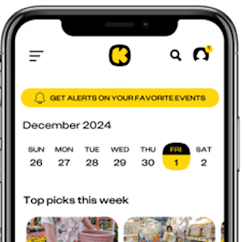You’ve probably noticed lately that the job market is … yikes. But thankfully, after pounding the proverbial pavement, you finally got a hit. You’ve gone through three interviews and a background check all culminating in that almighty job offer. Hooray! Except the proposed salary is way lower than you expected. So how can you ask for more money on a job offer?
We talked to a few recruitment and HR professionals to learn how you can effectively navigate this tricky territory. After all, you don’t want to burn bridges, but you also want a credible paycheck.
Download The Krazy Coupon Lady app for more money-making ideas and money-saving deals, tips, and coupons.
15 Tips on Asking for More Money With a Job Offer
We get it — negotiating can be really scary. Follow these 15 tips to get the paycheck you really want.

1. Collect the *Proof* That Your Pay Should Be Higher
“Because I want more money” isn’t going to be good enough to sway a company into giving you more cash. You have to communicate the facts. For example:
- Do you have any specific degrees, certifications, or licenses that warrant more money?
- Is the cost of living in your city higher than what this salary would cover?
- Do you have as much experience as they’re asking for in a candidate … or more?
- Is the market average for this position more than what they’re offering?
That last one in particular is highly effective.
“I would recommend utilizing websites like Glassdoor and Indeed, where [candidates] can find out their true market worth,” says Liam Houlihan, a recruitment specialist. “Do that in advance of any sort of negotiation with an employer.”
Houlihan emphasizes the main reason for knowing market worth above everything else is that recruiters/companies are almost always aware of what the market pays. The candidate is at a disadvantage if they don’t know their own worth. Write down talking points for your negotiations. You need to give a potential employer concrete, tangible reasons why you should get more money.
2. Provide Specific Numbers
Identify how much more you need salary-wise to make this a viable job offer. Being wishy-washy about the amount isn’t going to help your cause.
“Clearly communicate to the recruiter/company how much more money you are looking for,” Houlihan says. “One thing that both the candidate and the recruiter should always keep in mind is that hiring/the offer process is a business transaction, I cannot try to help increase compensation unless the candidate gives me some sort of specifics on what they are looking for.”
It’s safe to say many job candidates don’t feel comfortable with negotiation. Because of this, they may try to ask for more money in a roundabout, subtle way. But there’s no beating around the bush here. Being direct is best.
“Sometimes candidates aren’t asking for any specific amount of money at all,” Houlihan says. “When candidates do this, it not only makes it harder on me as a recruiter to figure out what they want, but it also makes it more difficult to ‘go to bat’ for them internally. I need to be able to make the case with my higher-ups for approval.”
Fact: asking for more money on a job offer can be really intimidating. But remember that by being clear and up-front with your recruiter/interviewer, you’re making their life easier and improving your odds of getting what you want.
3. Start and End the Conversation With Gratitude
If you’ve reached a stage of the interview and hiring process where an offer is presented, you’ve likely invested a good deal of time into this. Hey, so have they! It’s important to be mindful of this.
“The first thing candidates should always do once receiving an offer is to thank the recruiter/employer, and do it in a way that comes across as genuine,” Houlihan says.
He recommends candidates do this in all cases, even if they feel the offer is too low.
“Candidates probably often forget that recruiters are people, too,” Houlihan says. “We can be insulted or put off depending on the way the candidate conducts themselves.”
As you’re negotiating, start and end every conversation about it (whether by phone or email) with a positive statement expressing gratitude. For example, you might begin your email response with:
Thank you very much for the offer. I’m grateful for this opportunity and am eager to move forward.
Then you can start talking numbers within the response. When you’re done, close it out with something like:
Thank you again for the opportunity. I look forward to a fulfilling journey with [COMPANY NAME].
It’s like a sandwich: you slip the negotiating in between two pieces of positivity bread.
4. Always Start High, Not Low
If you give them a number that’s lower than you want, it can only get worse from there. It’s better to ask for a salary that’s on the slightly higher end of what you want. That way, if you end up negotiating, you still have some breathing room.
The same idea applies if you supply a desired salary range. Keep in mind there’s a good chance that they’ll automatically give you something on the lower end of that range. So make sure the low end is something you’ll be happy with.
5. Stay Confident and Concise
If you express doubt when asking for more money on a job offer, then you’re giving the employer permission to doubt you. Avoid overexplaining, apologizing, or making excuses. For example:
- Instead of saying, “It’s just that this offer is way below what the market pays. It doesn’t really feel fair, compared to what similar professionals are making,” say, “The proposed salary is below the market average for this position.”
- Instead of saying, “I’m really sorry to ask this, but is there any chance we could meet in the middle?” say, “[YOUR PROPOSED SALARY] is more in line with my credentials and experience.”
- Instead of saying, “If there’s no room in the budget to increase the salary, is there any chance we can meet in the middle with more PTO and opportunities to work from home?” say, “I’m open to meeting halfway with increased PTO and work-from-home Fridays.”
These are just examples, so personalize them in ways that feel true and accurate for you.
“This does not need to be more than a few sentences,” Houlihan says, referring to the ask for more money. “I would resist the temptation to do a deep-dive analysis on the data. The recruiter will know exactly what a candidate is asking for at that point. Keep things brief to avoid irritating the recruiter by making them read a 5-paragraph long email full of justification and analysis.”
Gill Hasson, author of Career Finder, echoes a similar thought, noting that the biggest mistake candidates make is when “they don’t clearly specify why and in what way they deserve more money — in what way or ways they add value to the organization.”
Part of this, too, is knowing what your limits are and communicating them.
“Decide what you want, what you don’t want, how far you’ll compromise, what you’ll do if you don’t get what you want,” Hasson says. “These are simply the principles/rules of assertiveness.”
Related: Hobbies That Can Make You Money
6. Ask Questions and Get More Information
When you ask for more money on a job offer, you might be met with surprise or even negativity. First and foremost, stay calm. Remember that you’re on the same team. You want to be hired, and they want to hire you.
Then explore more by asking neutral, open-ended questions. For example, you might ask them:
- How did you determine the salary for this position?
- What other factors could we possibly negotiate?
- What else can I offer to make myself a more desirable candidate?
- Will you commit to a performance review in six months, where we can revisit salary expectations?
7. When Needed, Take a Break Before Responding
Responding when you’re emotional usually isn’t a good idea. So if you receive a response that has you in a tizzy, pause and take a breath.
If it happens during an email conversation, walk away from your inbox for 30 minutes, cool down, and come back with a clear head.
If it happens over the phone, don’t panic. Count to five and take a deep breath before responding. If the recruiter asks you a question that you don’t immediately have an answer to, honesty is the best policy. You can say, “Let me think about that for a moment,” or “I can get you an answer on that by the end of the day.”
Remember this: the employer spent weeks or months looking for you. If you need a few minutes or hours to communicate with them, that’s okay!
8. If Your Expenses Will Go Up as a Result of This Job, Say So
Do you need to relocate for a job? Before you accept the offer, tell them and ask if they are willing to cover a percentage of your moving costs. Would this new job require you to drive significantly further? Ask if you can get a stipend for gas.
Hopefully this goes without saying, but only do this if your expenses will indeed go up, and you should be able to demonstrate that. Don’t say you’ll have a 2-hour commute each day if you won’t.
9. Practice With a Friend First
The first time you ask for more money on a job offer should not be with the employer themselves. If you practice in advance, you’re going to feel much more confident, calm, and prepared.
Rehearse with a friend via both phone and email. Have them play the parts of different recruiters. For instance, role-play a recruiter who’s very easy to negotiate with and then a recruiter who pushes back against your requests more aggressively.
If you’re proactive in practicing ahead of time, then you’re less likely to be caught off guard.
10. Always Mind Your Manners
In addition to expressing gratitude for the offer, remember that manners go a long way.
“Recruiters (in many cases) can be your best advocate internally within the company/organization when it comes to negotiation, so treat them well,” Houlihan says. “Use your manners and be kind and respectful of them and their time. This is not only the right thing to do, but it also makes recruiters more inclined to argue for you internally.”
11. Be Flexible With What You’re Willing to Accept
Your paycheck isn’t the only compensation you receive, so consider other terms of the job offer.
“Let’s separate this answer into two areas: compensation and non-compensation,” Houlihan says. “On the compensation part, a lot of companies offer at least one bonus per year. Some offer multiple. There are cases in which these bonuses cannot be negotiated, but it never hurts to ask. Another thing that can be negotiated in most situations is a signing bonus, which candidates usually receive within the first few months of starting employment.”
Now, let’s look at the non-compensation side. Houlihan suggests looking closely at vacation/PTO. He also thinks candidates should consider work/life balance in negotiations and whether work from home flexibility is an option.
“This is something that I would encourage candidates to ask questions about upfront,” he says. “Make sure you are clear on the company expectations before you start, even if there is no room for negotiation on it.”
Then the last major non-monetary negotiation point is job title, if that’s something important to the candidate.
“It’s always fair game to try to negotiate a change,” Houlihan says.
Being flexible is great (and necessary), but also know where this ends. Hasson emphasizes the need for a plan B.
“What you will do if you don’t get what you want?” he says. “For example, you may decide to stay in (your current) job for another year because you need the experience. Or, you might stay where you are but begin looking for another job.”
12. Be Ready for Tough Questions
You’re going to be asking tough questions, and you might be getting some in return. When you start to push back on salary and ask for more money, it signals to the company/recruiter that you’re serious about the job. So be ready for questions like:
- Are we your only current offer?
- If we make an offer, will you say yes?
- Are we your top choice? If not, where do we stand?
These can be uncomfortable to answer, understandably. However, remember that being up front, straightforward, and concise benefits all parties involved.
13. Avoid Nickel-and-Diming
Negotiating isn’t a tactic that we use to squeeze every last possible cent out of the employer. It’s to make sure that your compensation and benefits package matches your field, market value, and level of expertise.
If they offer you $60,000 a year and you think you can convince them to bump it to $62,000, you might want to reconsider. This isn’t necessarily the best reflection of you. On the other hand, if you feel like $60,000 is significantly lower and you expect something closer to $70,000, that’s the time to negotiate.
14. Lay Down Your Requirements All at Once
Let’s say that your first reply to the recruiter is asking for more money on your job offer. You work together to settle that and it’s done. Then you send your next email asking for more PTO. And then work-from-home days. It’s email after email where you’re asking for more.
Even if this isn’t your intention, taking this approach can make you sound greedy. It can also make the recruiter’s life harder. Instead, lay it all out there in one single email (or one phone conversation).
15. Remember: You Are on the Same Team
Finally, we want to leave you with this: it’s not you against the recruiter or you against the employer. You’re on the same side, and you want to aim to work together. They need to hire someone, and you need a job. It’s a win-win!
Always stay polite and positive but firm. Clearly communicate your wishes but leave some room for flexibility. If you follow the tips we’ve outlined, you’ll land your dream job sooner than you think!
Download the KCL app to add and redeem coupons in store




























































































